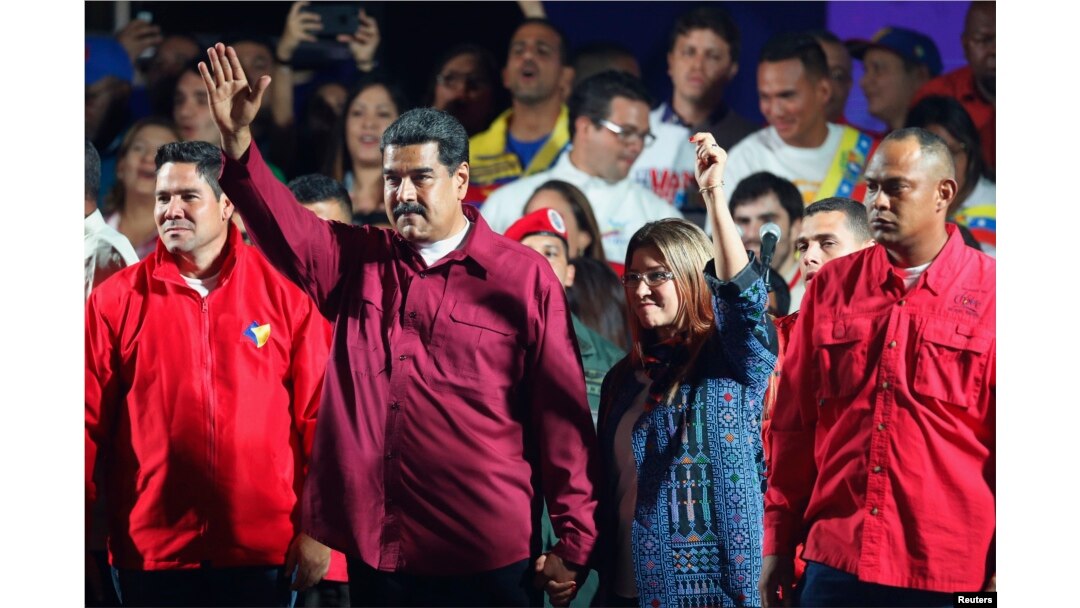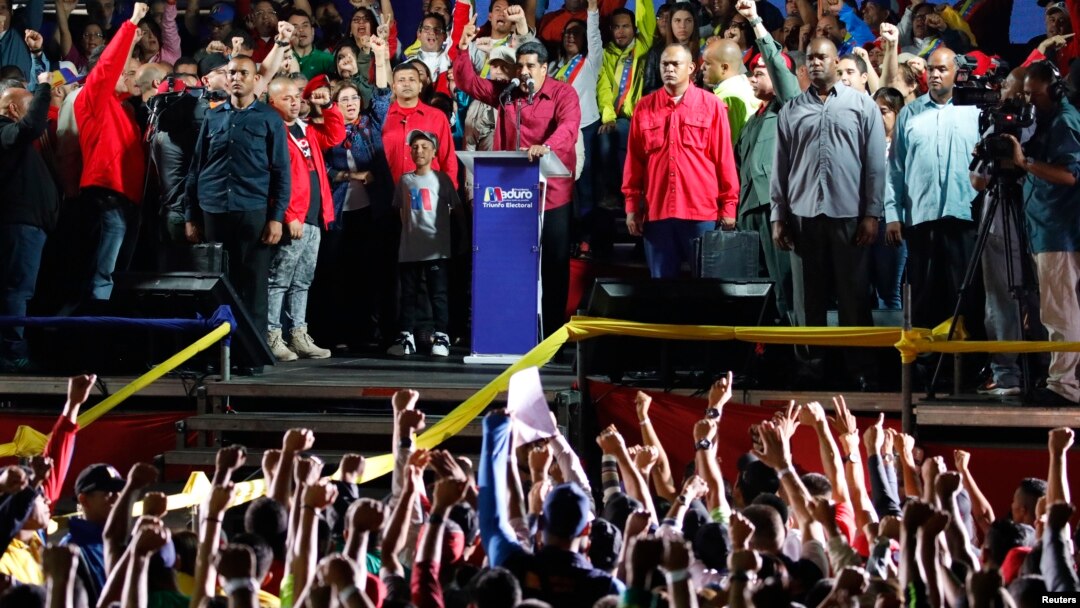The United States imposed economic sanctions Monday on Venezuela for what it said was the country's "fraudulent" re-election of President Nicolas Maduro to a second six-year term.
President Donald Trump signed an executive order that banned Americans from oil transactions with Venezuela, once one of the world's top oil producers.
Caracas on Monday slammed the news of the sanctions. Foreign Minister Jorge Arreaza told journalists that the sanctions were completely illegal measures, calling them "madness, barbaric and in absolute contradiction to international law."
WATCH: US Sanctions
Your browser doesn’t support HTML5
US Imposes New Economic Sanctions Against Venezuela After Maduro Win
A senior White House official told reporters, "Today's executive order closes another avenue for corruption that we have observed being used. It denies corrupt Venezuelan officials the ability to improperly value and sell off public assets in return for kickbacks."
In a statement, U.S. Secretary of State Mike Pompeo called Maduro's re-election "an attack on constitutional order and an affront to Venezuela's tradition of democracy. Until the Maduro regime restores a democratic path in Venezuela through free, fair and transparent elections, the government faces isolation from the international community."
Pompeo declared, "The United States stands with democratic nations in support of the Venezuelan people and will take swift economic and diplomatic actions to support the restoration of their democracy."

Venezuela's President Nicolas Maduro and his wife Cilia Flores wave to supporters after the National Electoral Council announced that with almost 93 percent of polling stations reporting, Maduro won nearly 68 percent of the votes in Sunday's election, beating his nearest challenger Henri Falcon by almost 40 points, in Caracas, Venezuela, May 20, 2018.
Maduro hailed his re-election as a "historic record" after officials said he won 68 percent of the vote, far ahead of the 21 percent won by his closest rival, ex-army officer Henri Falcon. But with months of economic turmoil in Venezuela, marked by food and medicine shortages, and violent unrest, a historic 52 percent of voters abstained from voting, and the Democratic Unity Roundtable opposition boycotted the election as a "farce."
Maduro faced growing international protests about the vote, with Argentina, Brazil and Canada all recalling their ambassadors from Caracas.
A coalition of 14 countries across the Americas, including Brazil, Colombia and Mexico, said they would scale back diplomatic ties with Caracas. While Spain Prime Minister Mariano Rajoy said he would consult with European counterparts on new measures in hopes of "easing the suffering of Venezuelans.''
El Salvador and Cuba, on the other hand, congratulated President Maduro on his election win.
Jennifer McCoy, a political science professor at Georgia State University and former director of the Carter Center's America's program, told VOA she expects Venezuela to become more isolated.
"This Maduro government is going to be under increasing economic and financial pressure to make some changes, so we’ll have to see if they do actually make some policy changes and address the misery of the country and help themselves from their dire economic straits, or not, and if they don’t I think they’ll have to rely more and more on repression to stay in power," McCoy said.
Pompeo criticized the election as being "choreographed by a regime too unpopular and afraid of its own people to risk free elections and open competition."
The top U.S. diplomat said as of a week ago, "more than 338 political prisoners remained jailed, more than in all other countries in the hemisphere combined."
Maduro, a 55-year-old former bus driver, was expected to win despite a deepening crisis that has made food scarce and inflation soar as oil production plummets.
Venezuelan presidential candidate Henri Falcon reacts to the results of the election at Falcon's press center in Caracas, Venezuela, May 20, 2018.
Former state governor Falcon was Maduro's main challenger, but his chances were hurt by the presence of a second anti-Maduro candidate in the race, evangelical pastor Javier Bertucci.
"We do not recognize this electoral process as valid, as true," Falcon said Sunday."For us, there were no elections.We have to have new elections in Venezuela."
Bertucci also called for a new vote.
Falcon condemned the government's placement of red tents near polling stations around the country, where Venezuelans were asked to scan their "fatherland cards" after voting in the hope of receiving a prize.The state-issued cards are used to receive benefits, including food boxes. Critics said the scheme amounted to vote-buying.
U.S. Vice President Mike Pence criticized the election as a "sham, neither free nor fair."
"The illegitimate result of this fake process is a further blow to the proud democratic tradition of Venezuela," Pence said in a statement Monday. "America stands against dictatorship and with the people of Venezuela. The Maduro regime must allow humanitarian aid into Venezuela and must allow its people to be heard."
Maduro, the self-described "son" of Hugo Chavez, said on Saturday that he is battling a U.S. "imperialist" plot to crush socialism and take over the OPEC nation's oil wealth.
On Friday, the Trump administration added a key Maduro ally to a growing list of top officials targeted by financial sanctions, accusing socialist party boss Diosdado Cabello of drug trafficking and embezzlement.
Maduro's opponents said the leftist leader has destroyed Venezuela's once-wealthy economy and ruthlessly crushed dissent. Polls also show Venezuelans overwhelmingly blame Maduro for their mounting troubles.
More than 1 million Venezuelans have left their country in recent years for a better life abroad, while those staying behind wait in line for hours to buy subsidized food and withdraw cash that is almost impossible to find.
VOA's Spanish Service contributed.


